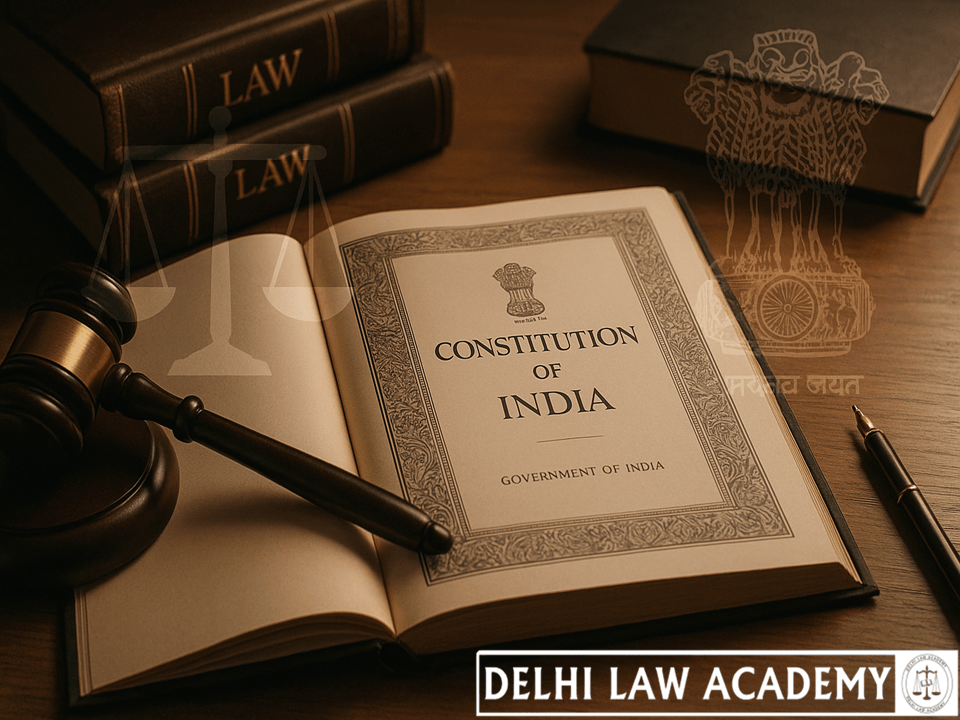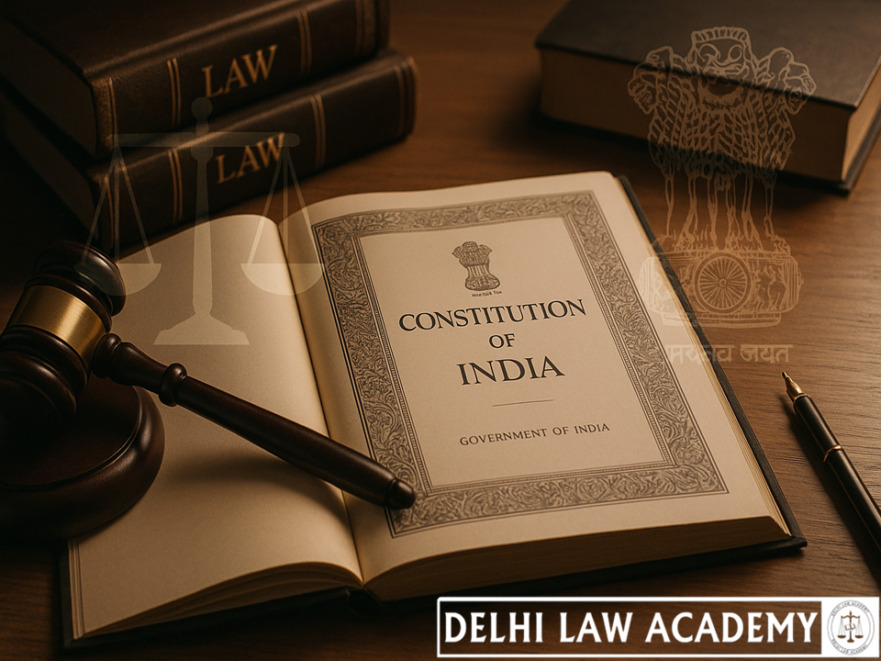
🏛️ Union Territories & Ordinance Powers (Articles 123–241)
Delhi Law Academy Jaipur presents below for aspirants of RJS, DJS, PCS (J) and other Judicial Services throughout India a simplified Note on the Constitutional provisions relating to the Union territories and the Legislative powers of the President and the Governors.
📘 TOPICS
- Legislative powers of President – Article 123
- Legislative powers of Governor – Article 213
- Administration of UTs – Article 239
- Special provisions for Delhi – Article 239AA
- Failure of Constitutional machinery in UTs – Article 239AB
- Presidential regulations – Article 240
- High Courts for UTs – Article 241
📜 Constitutional Provisions
⚖️ Legislative powers of President — Article 123
• If President is satisfied
o that immediate action is required
o he may promulgate ordinances
• He can do so at any time
o except when both Houses are in session
• Such an ordinance shall have
o the same force and effect as an Act of Parliament
• Every ordinance is to be laid before both Houses
• It shall cease to operate
o at the end of 6 weeks from reassembly of Parliament
o earlier, if both Houses pass resolutions disapproving it
• The 6-week period shall be counted
o from the date on which the second House reassembles
• An ordinance cannot make any provision
o which Parliament is not competent to enact
• If it does so
o it would be void to that extent
🏛️ Legislative powers of Governor — Article 213
• If Governor is satisfied
o that immediate action is required
• he may promulgate ordinances
• He can do so at any time
o except when State Legislature is in session
• An ordinance shall have the same force and effect
o as an Act of State Legislature
• Governor shall take instructions from President before promulgating Ordinance
o if a similar Bill would have required
previous sanction of President before introduction
o if it was necessary for him
to reserve a similar Bill for consideration of President
o if a similar Act would have been invalid
unless it was reserved for President and had received his assent
• Every ordinance is to be laid before Legislature
• It shall cease to operate
o at the end of 6 weeks from reassembly of State Legislature
o earlier, if Legislature passes resolution disapproving it
• Ordinance cannot make any provision
o which State Legislature is not competent to enact
• If it does so
o it would be void to that extent
🏛️ UNION TERRITORIES — Article 239
• Every Union Territory shall be administered by President
o through an administrator to be appointed by him
• President may appoint Governor of a State
o as administrator of an adjoining UT
• In such case, he shall exercise his functions
o independently of his council of ministers
🏛️ Legislature for Puducherry — Article 239A
• Parliament may by law create for Puducherry
o a legislature and a council of ministers
o with powers and functions specified in that law
[Inserted by the 14th Amendment Act, 1962]
🏙️ Special Provisions for Delhi — Article 239AA
• Union Territory of Delhi shall be called
o National Capital Territory of Delhi
• Its administrator shall be called
o Lieutenant Governor
• There shall be a Legislative Assembly for NCT
o to be filled by members
o chosen by direct election from territorial constituencies
• Number of seats in Assembly
o shall be determined by Parliament by law
• Assembly shall have power to make laws for NCT
o on matters in State List or Concurrent List
o except Entries 1, 2 and 18 of State List
• Parliament shall continue to have power
o to make laws on any matter
• If a law made by Assembly
o is repugnant to a law made by Parliament
• law made by Parliament shall prevail
o except when the Assembly law had received Presidential assent
• There shall be a Council of Ministers
• Number of Ministers
o not to exceed 10% of Assembly members
• It shall aid and advise LG
o in matters in which Assembly has power to make laws
• In case of difference of opinion
o between LG and his Ministers:
• LG has to refer the matter to President
o and act according to President’s decision
• Pending such decision
o LG is competent to act in his discretion
o if in his opinion, matter is urgent, requiring immediate action
• Chief Minister shall be appointed
o by President
• Other Ministers shall be appointed by President
o on advice of Chief Minister
• Ministers shall hold office
o during pleasure of President
• Council of Ministers shall be
o collectively responsible to Legislative Assembly
• Parliament may by law
o supplement provisions contained in this article
• Any such law shall not be deemed
o to be an amendment u/a Article 368
⚠️ Failure of Constitutional Machinery — Article 239AB
• If President is satisfied that
o administration of NCT cannot be carried on
as per article 239AA or a law made thereunder or
o it is necessary for proper administration of NCT
• he may suspend this article or such law for a specified period
📘 Ordinances by UT Administrators — Article 239B
• Administrators of Puducherry and Delhi
o have powers to promulgate Ordinances
o when legislatures are not in session
• Such ordinance can be promulgated
o only after obtaining instructions from President
• Such ordinance shall cease to operate
o on expiry of 6 weeks from reassembly of legislature or
o immediately upon passing of resolution disapproving the ordinance
📜 Presidential Regulations — Article 240
• President may make regulations for peace, progress and good government of
o Andaman & Nicobar
o Lakshadweep
o Dadra & Nagar Haveli
o Daman & Diu
• Any such regulation may repeal or amend
o any Act of Parliament or any other law in force
• A regulation shall have the same force and effect
o as an Act of Parliament
⚖️ High Courts for UTs — Article 241
• Parliament may by law
o constitute a High Court for a Union Territory
📘 Stay Ahead with Delhi Law Academy!
Get access to free monthly current affairs, read our insightful blogs,
and explore free study resources prepared by experts at DLA Jaipur. 🚀
Frequently Asked Questions (FAQs)
Contact us
📍 Delhi Law Academy – Jaipur Branch
6C, Tower 2, Coaching Hub, Pratap Nagar, Jaipur – 302033
📞 Phone:
+91 9911916552
+91 8447285606
✉️ Email:
contactus@delhilawacademy.com

